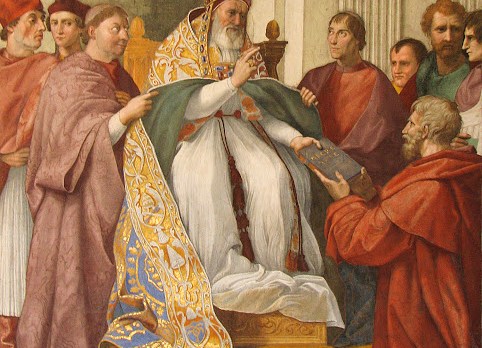If you look back to the ceremonies of popes you’ll see them wearing headgear called “the triple tiara.” This ornate, three-tiered crown was worn by the popes from the eighth through the mid-twentieth century. The three crowns represented the pope’s ultimate power on heaven and earth.
Seated like a monarch on his throne called the sedia gestatoria the pope would be carried by a squad of men shoulder height. Servants surrounded him waving ornate fans called flabellum—made from ostrich or peacock feathers—an ancient sign of an oriental potentate dating back to the time of the Pharaohs.
Pope Paul VI was the last pope to wear the triple tiara and be carried on the sedia gestatoria. Since then popes have opted for simpler presentation—turning away from the trappings of a royal court in favor of simplicity and accessibility. Their doing so runs parallel with a more down to earth approach for most royal houses across the world.
Despite his simpler approach however, is there part of the pope’s ministry which should be that of a monarch? The first pope Peter was a simple fisherman and Jesus was a carpenter. Was it a mistake that any popes assumed royal power and status down through history? Is the pope a monarch in any way?
The answer is “yes” and “no.”
Jesus certainly did not plan for the pompous and corrupt popes of the popular imagination. Whether he ever intended popes to wield political and worldly power is very doubtful. After all he said, “Render to Caesar that which is Caesar’s” and “My kingdom is not of this world.”
On the other hand Jesus Christ is “the King of Kings and Lord of Lords.” He said “all authority on heaven and earth is given to me.” (Mt 28.18-20) Jesus intended to found a church, and it was established with clear individual leadership. In Matthew 16.18-19 Jesus says to Simon Peter, “You are Peter, and on this Rock I will build my church, and the gates of Hell will not overcome it.” So, Jesus established his church not on a democratic model, but on the model of personal leadership.
Was this a monarchical papacy? Was Peter the first king in the kingdom of God? It’s more like Peter was the Prime Minister in the Kingdom of God. In Matthew 16 Jesus says to Peter, “I will give you the keys of the kingdom of heaven; whatever you bind on earth will be bound in heaven, and whatever you loose on earth will be loosed in heaven.”
He is quoting from the Old Testament book of Isaiah. In chapter twenty-two Isaiah recognizes Eliakim as the steward of the royal House of David. The keys of the kingdom were the sign of his personal authority delegated by the king himself. Jesus never intended the pope to be a king in the corrupt worldly sense, but the church leadership Jesus intended was “monarchical” in the sense that it was based on his authority as King of Kings.
The reference to Isaiah 22 shows that the structure of Jesus’ kingdom was modeled on King David’s dynastic court. In Luke 1.32-33 Jesus’ birth is announced in royal terms. He will inherit the throne of his father David. He will rule over the house of Jacob and his kingdom shall never end.
Like the steward Eliakim, Peter is to be the appointed authority in this court, and as such his role is that of steward and ruler in the absence of the High King. That Peter assumes this preeminent role of leadership in the early church is attested to throughout the New Testament from his first place in the list of the apostles, to his dynamic preaching on the day of Pentecost, his decision making at the Council of Jerusalem and the deference shown to him by St. Paul and the other apostles.
Jesus didn’t plan for the pope to be king in the worldly way, but he did plan for one man to be his royal delegate on earth. He did plan for one man to be the steward and lead the others (Lk.22.32) He did plan for one man to take up the spiritual and temporal leadership of his church. This is also seen in the final chapter of John’s gospel where Jesus the Good Shepherd asks Peter to “feed his sheep” and take over the role not only of Steward but Shepherd of the flock.
The role of the Pope as the Prime Minister of the Kingdom is best seen on Holy Thursday when he washes the feet of others. Jesus’ words, “The Son of Man has not come to be served but to serve” echoes in the actions of the Pope who kneels to serve. Along with all the titles of honor and power ascribed to the pope, one of the most ancient titles of the Pope is “the servant of the servants of God.”
This paradox lies at the heart not only of the life of Christ and the papacy, but it also lies at the heart of what it means to be Christ’s disciples. On the one hand the baptized are adopted sons and daughters of the King—princes and princes in the royal kingdom. On the other hand, like Christ himself we are all called not to be served, but to serve.
Follow Fr Longenecker’s blog, browse his books and be in touch at dwightlongenecker.com.

